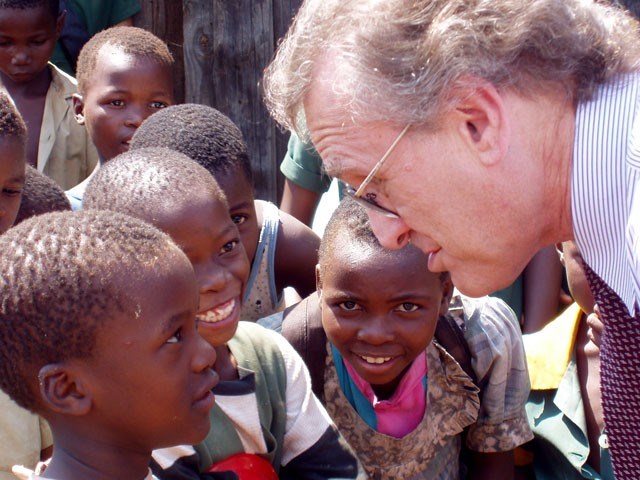In just five short years the Stephen Lewis Foundation has raised more than $26 million to help fight HIV/AIDS in Africa.
Twenty-six million dollars! That was beyond Stephen Lewis’s wildest dreams when he started the foundation in 2003. At that time he was the UN Special Envoy for AIDS in Africa, seeing first hand the devastation and the areas of greatest need — the millions of women dying, their orphaned children left behind, the grandmothers who step in to fill the void.
Since then millions of dollars have been funneled through grassroots organizations to the very people affected most, whether it’s providing soap and clothes to infected women or paying for school fees for orphans.
Stephen Lewis takes time out of his busy humanitarian schedule to speak candidly and passionately with Pique’s Alison Taylor about his foundation, about the crisis ravaging Africa and about our responsibility to do something about it.
Amid the despair, the horror and the unimaginable atrocities, Lewis ultimately has a vision of hope.
He is coming to Whistler on Friday, Oct. 19 to speak to corridor residents about it.
Q: There’s a lot of anticipation about your upcoming talk in Whistler. Why did you accept the invitation from the Whistler Social Sustainability Speaker Series to speak to the community?
A: I’ll accept an invitation from anyone where I can discuss important issues of the day. It’s a tremendous privilege to do so…. In a sense, it’s a community event in Whistler and it will focus to some extend on my foundation and therefore I will obviously be discussing issues of HIV and AIDS, but in the process I will want to discuss poverty and conflict and all of the things in the developing world which are compromising the lives that people lead.
Q: Just last month you visited Kenya, South Africa and Lesotho. Do you leave Africa with a sense of despair after each visit or are you filled with hope when you see that your on-the-ground programs are making a difference in the day-to-day lives of Africans?
A: There’s tremendous gratification in seeing the value of working with people right on the ground, right at the community level, right at the grassroots, because it can change and save and improve human life. But it’s also sometimes pretty despairing to watch the intense struggle for survival that grips so many of those countries. Africans are resilient, courageous, determined to overcome the pandemic but as they overcome it, it’s still taking a terrible toll.
Q: You first went to Africa in your early 20s after receiving an invitation to attend a conference in Ghana. You stayed for a year working, traveling and teaching in various places. How did that trip change you and shape your future?
A: Well, Africa gets into the blood. It happens to everyone. Nobody goes to Africa and comes back unchanged. And almost everybody in my life that I’ve met who has journeyed to Africa wants to go back. So by the age of 21 or 22 I knew that I wanted to go back to that continent and I’ve been going back pretty regularly for 47 years.
Q: While in Nairobi during this last trip, you issued a press conference statement about what you call “the holocaust of horror” visited on women and girls in the Democratic Republic of the Congo: “If we don’t do something, and soon, HIV/AIDS and violence against women are destined to win. And having chosen to do nothing, the world community will be to blame.” Do you think we each have an individual responsibility to do something about this “holocaust of horror” happening not only in the Congo but also across Africa?
A: Yes, I think particularly in the wealthy world, in the G8 world there is a real obligation to care about what’s happening to the other part of humanity, the part of humankind that’s under siege. And we can all do something about it, whether it’s a financial contribution or joining an NGO or a church group or a community organization or just raising consciousness, taking an interest, being a part of Make Poverty History or all the wonderful NGOs, from World Vision to Doctors Without Borders. It’s just important to spend a small chunk of life devoted to improving the human condition…. I think whether it’s the horror of the Congo or whether it’s the calamitous catastrophe of AIDS, it’s really important that those of us who live lives of privilege understand that we have some obligation to the rest of the world.
Stay tuned for more of this interview in next week’s Pique when Lewis talks about his Grandmothers to Grandmothers campaign, how just $10 can change a life and how a UN women’s agency is critical to the battle.
Tickets for the Oct. 19 event are $20, available at Armchair Books in Whistler and Mostly Books in Squamish (cash only). More details of the evening will be published next Thursday.




